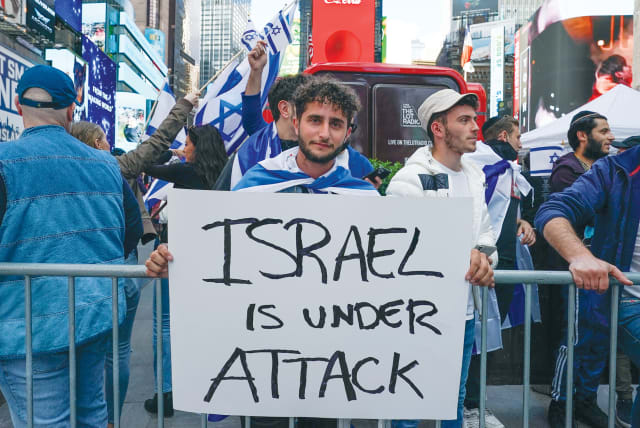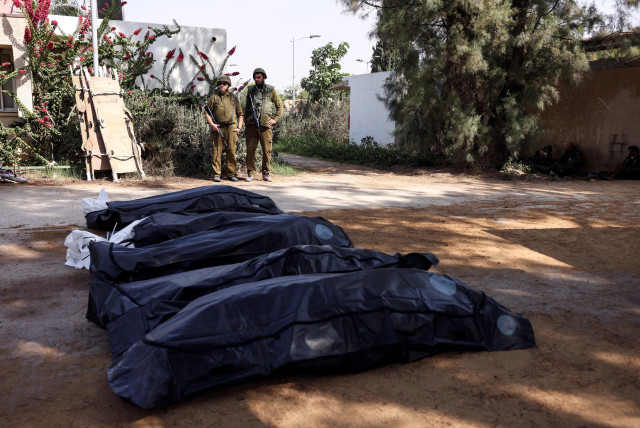Unprecedented times lead to unprecedented support - opinion

Jewish communities and non-Jewish individuals across the entire world have been spurred on to demonstrate their support for Israel.
By the time these words are published, almost a full week will have passed since the heinous attacks that began the bloody war on October 7. With the passing of each day, more and more atrocities are being discovered: War crimes on a massive scale were inflicted upon innocent Israelis with ISIS-like beheadings, homes set alight with residents still inside, slaughtered ravers who simply wanted to spend Friday night dancing in the desert. One poignant and simple fact that epitomizes the scope of the tragedy is the apparent shortage of people to dig graves quickly enough for the many Israeli victims.
This surreal situation has naturally led us Israelis, and our friends in the Diaspora, to compare this unfolding reality to other tragedies well-known to the Jewish people such as the Holocaust and the Yom Kippur War. The value in making such comparisons is, in some way, to enable the human mind to grasp the magnitude and depths of depravity to which the terrorists have sunk. The downside, however, is that neither of these seminal events explains this one, which is unprecedented in Jewish history.
The events leading up to and surrounding the attacks on October 7 are different from those surrounding the Holocaust, not least because we have a strong Jewish state that is fully committed to the security and well-being of all its citizens, with powerful, well-equipped, and well-trained security forces. Additionally, it is nothing like the Yom Kippur War because terrorists succeeded in infiltrating Israel. Hence, most of the murdered and those taken hostage are civilians – mothers, babies, toddlers, teenagers, elderly men, and women.
A third analogy, and perhaps the most suitable one to use as a launching pad to enable us to grasp the magnitude of the situation, is 9/11. Taking into account the size of Israel’s population, proportionally, the death toll from last week’s atrocities is substantially greater than that of 9/11.
In Israel, a country with little over nine million citizens, the death toll currently stands in excess of 1,300 and rising. By way of comparison, 2,996 people were murdered on 9/11, out of almost 285 million American citizens.
Another new feature, that has compounded the dire situation into which Israel has been plunged, is the widespread use of social media as a means to extend the threat of terror and heighten Israelis’ sense of insecurity. The many definitions coined to explain the term “terrorism” tend to include four elements: Violent crimes, committed against citizens, with the aim of spreading fear and terror among a population far exceeding the number of victims directly impacted, for a political end.
As all four boxes of this definition were easily ticked when analyzing the recent attacks on Israel – thanks to vile clips both filmed and shared by Hamas on social media – Jewish communities and non-Jewish individuals across the entire world have been spurred on to demonstrate their support for Israel.
Worldwide support for Israel
THIS SHOW of support is our silver lining. Heartwarming images of blue and white lights and Israeli flags decorating state establishment buildings across the world, along with solemn demonstrations of Jewish communities praying for Israel, or singing Hatikva, is what Israelis share with each other during these horrific days to keep spirits high.
Another ray of light comes from the exceptional unity, kindness, mutual responsibility (arvut hadadit), and entrepreneurial spirit that this nation is demonstrating. Communities congregate on every corner to collect, sort, pack, and deliver equipment to citizens and security forces on the frontlines. Initiatives of individuals who collect dogs whose owners have been murdered or hospitalized, for example, further illustrate our community spirit which is in marked contrast to that of our enemies.
This community spirit, when set against the backdrop of the increasing number of heartbreaking stories of Hamas’s war crimes, must be at the forefront of another battle we will soon need to fight. The battle for Israel’s legitimacy to strike back at our attackers. While Israel is certainly benefiting from wall-to-wall international support as we near the end of the first week of fighting, this support will likely wane as we strike back at our enemies in the quest to ensure that these atrocities will never be repeated.
We have already seen how Hamas supporters, on university campuses and in the media, are working to produce a counter-narrative to the plain and simple facts, on two levels. First, by contextualizing this unprecedented ruthless attack on Israeli citizens as a legitimate action of resistance in the endless circle of violence inherent to the decades-long Israeli-Palestinian conflict. Second, by normalizing Hamas as moral and ethical freedom fighters.
The war that has been waged on Israel since October 7 opens a new page in Israel’s and the Jewish people’s history book. Although there will be a time, at some point in the future, for questions and investigations, now is the time to stand shoulder-to-shoulder: Different sectors of the Israeli public; different factions and parties in the Knesset; Israel and Jewish communities across the world; Israel and states across the globe that advocate for humane, universal values. We need support and solidarity to win this war, not only on the battlefield but also in the international court of public opinion, whose work will intensify as Israel fights to defend itself.
The writer is an adjunct lecturer at Tel Aviv University and a founding member of the Dvorah Forum: Women in Foreign Policy and National Security.
Jerusalem Post Store
`; document.getElementById("linkPremium").innerHTML = cont; var divWithLink = document.getElementById("premium-link"); if (divWithLink !== null && divWithLink !== 'undefined') { divWithLink.style.border = "solid 1px #cb0f3e"; divWithLink.style.textAlign = "center"; divWithLink.style.marginBottom = "15px"; divWithLink.style.marginTop = "15px"; divWithLink.style.width = "100%"; divWithLink.style.backgroundColor = "#122952"; divWithLink.style.color = "#ffffff"; divWithLink.style.lineHeight = "1.5"; } } (function (v, i) { });

